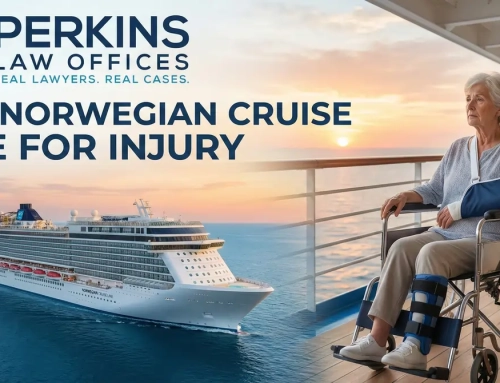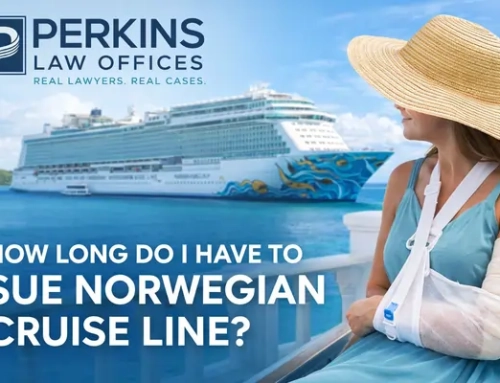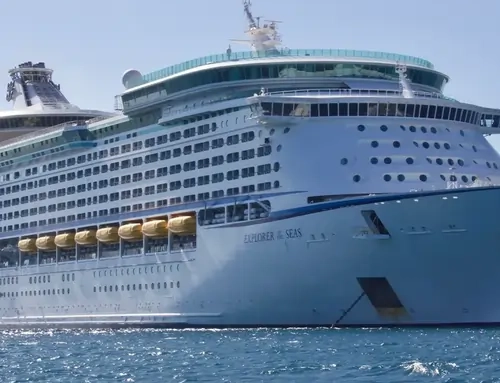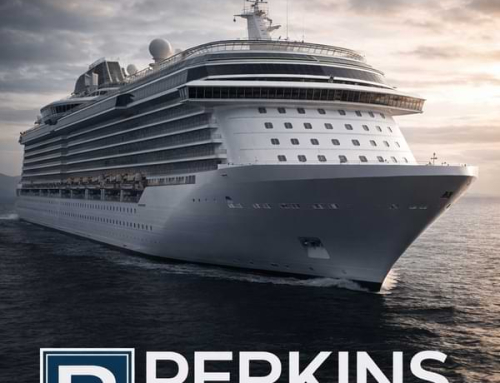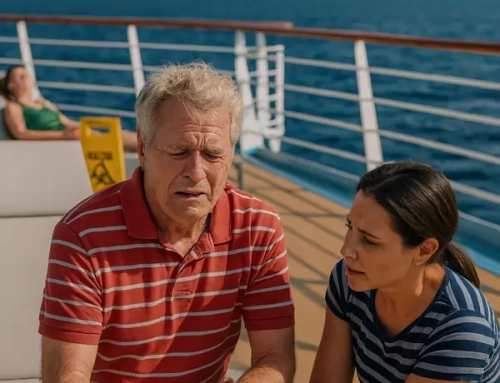Can I sue the Cruise Line If I was Injured in International Waters, If So, What Laws Apply?
By Cruise Ship Attorney Alex Perkins, Perkins Personal Injury Lawyers – Miami, FL
When I tell people who I meet for the first time that I am a “cruise ship injury lawyer”, I almost always get the same reaction. At first, they seem surprised or a bit confused. But after I explain that “Ship Happens” at sea and that most major cruise lines ticket contracts require suits for injuries during a cruise voyage be brought in federal Court in South Florida, their interest peaks and inbound come the questions, fast and furious. Folks then realize this is serious business and that Perkins Law Offices is a highly regarded law firm in the cruise ship injury legal world having actively been suing the cruise lines for over 20 years and bringing justice to deserving clients,
Unfortunately, not every cruise vacation goes as planned. There is no limit to bad things can severely injure or kill a passenger on a during a cruise. My law firm has heard it all. I personally tend to believe the risk for personal to a passenger is actually higher during a cruise than what they would normally encounter in their daily life in that passengers are in unfamiliar circumstances with different risks. I find this especially fitting when it comes to slip and falls on a cruise. Slip and falls with injuries are the most common incident that my cruise ship law firm gets calls about. The lido deck and tile floor in the buffet area seem constant.
But does it make a difference where the ship was when the slip and fall or other incident injury occurred? Injured passengers often want to know if makes a difference if the ship was at sea in international waters, in a foreign port, or still in port in the US, or if it happened during a tour or excursion. They sometimes are concerned that they don’t know where in the ocean they were at when the injury occurred, or they worry they can’t bring a case in the United States because they were far from the United States or any countries’ shoreline for that matter. My answer is simple. As long as the cruise touched a U.S. port at some point, general maritime jurisdiction and injury laws under United States code will almost always apply regardless of ship location at the time of injury. This is for two reasons. First, your cruise ticket terms and conditions mandates exactly that to the exclusions of all other law. And, because that is what the federal law of the United States also mandates in most cases involving navigable waters. Some state laws may also enhance or supplement federal maritime law when the incident happens within a certain distances a state’s shore line, but U.S. general maritime will apply in all circumstances. The interplay between the terms and conditions of the passage contract, federal law, location of the incident and distinctions of navigable and non-navigable waters, can affect your legal rights. So below you can read about some of the basics or you can visit https://www.perkinslawoffices.com/cruise-ship-injuries/ :
What Are Navigable Waters?
Navigable waters are bodies of water that are capable of being used for interstate or foreign commerce. Under federal maritime law, this includes oceans, seas, bays, rivers, and other waterways that connect to interstate or international trade routes. The definition is broader than you might think—it’s not just about whether large commercial vessels can physically travel there, but whether the water has been used or is susceptible to use for commerce between states or nations.
For cruise ship passengers, this matters. When your vessel is operating on navigable waters, which is inevitably the case with cruise ships, federal maritime law automatically applies rather than state law. This means different rules govern everything from your cruise line’s liability for injuries to the time limits you have to file a lawsuit.
What Are Non-Navigable Waters?
Non-navigable waters are bodies of water that cannot support interstate or foreign commerce. These are typically small lakes, isolated ponds, or waterways that don’t connect to larger commercial water routes. I can’t think of a situation when an injury on a cruise ship would not be federal jurisdiction. It may be supplemented by state law depending how close to shore, but rarely if not never, would a cruise ship operate in truly non-navigable waters to allow only state laws to govern.
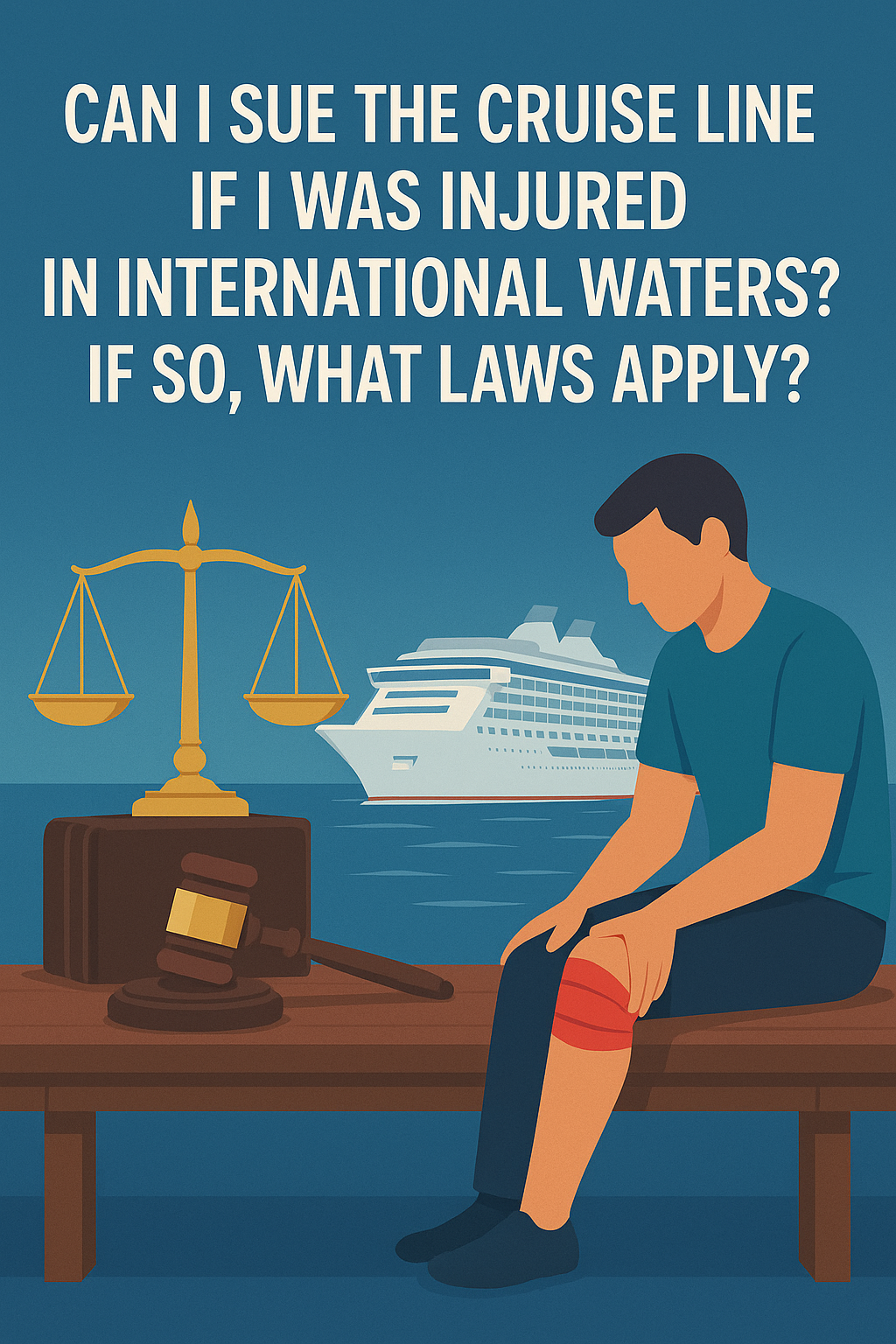
Can I sue the Cruise Line If I was Injured in International Waters, If So, What Laws Apply?
Why Maritime Law Applies to Navigable Waters
Maritime law, also called admiralty law, is a distinct body of federal law that has evolved over centuries to govern activities on navigable waters. Congress has constitutional authority under the Commerce Clause and the Admiralty Clause to regulate maritime commerce. This federal jurisdiction exists because maritime activities inherently involve interstate and international commerce, requiring uniform legal rules rather than a patchwork of different state laws.
When you’re injured on a cruise ship, maritime law determines the standard of care the cruise line owed you, the burden of proof you must meet, and critically, how long you have to bring your claim. General maritime law applies specific principles that can often differ significantly from land-based personal injury law.
The Three-Mile Limit: State Waters vs. Federal Waters
The three-mile limit is a crucial boundary in maritime law. This boundary extends three nautical miles from the U.S. coastline and represents the dividing line between state territorial waters and federal waters.
Within the three-mile limit: States have certain regulatory authority, though federal maritime law still applies to vessels engaged in maritime commerce. For cruise ships, this means that while the vessel is within three miles of shore, it’s still governed by maritime law, but certain state laws may have applicability for specific regulatory purposes and importantly for injury laws. This can be particularly true in wrongful death cases and whether the Death on the High Seas Act (DOHSA) applies or not which severely limits the allowable damages in a death case. You can read more about the Death on the High Seas Act here: https://www.perkinslawoffices.com/wrongful-death-on-a-cruise-ship-under-the-death-on-the-high-seas-act-dohsa/
Beyond the three-mile limit: You’re in federal waters where state law generally has no application. The cruise ship and any incidents aboard are governed exclusively by federal maritime law and the terms of your cruise ticket contract.
This distinction matters for several reasons. First, the applicable statute of limitations may differ. Second, the laws governing the cruise line’s duty of care are exclusively federal maritime principles. Third, your ticket contract—which we’ll discuss shortly—typically specifies different requirements depending on whether your claim arises within or beyond this limit.
The Twelve-Mile Limit: Contiguous Zone
Extending from the three-mile limit to twelve nautical miles from shore is what’s known as the contiguous zone. Within this zone, the United States can exercise control necessary to prevent and punish infringement of customs, fiscal, immigration, and sanitary laws within its territory and territorial sea.
For cruise ship passengers, this zone is less relevant to personal injury claims but becomes important in cases involving crimes aboard cruise ships. Under the Cruise Vessel Security and Safety Act of 2010 (CVSSA), cruise lines must report certain crimes to the FBI, and many of these incidents occur within this twelve-mile zone where U.S. law enforcement has jurisdiction. This can make all the difference in the world in getting cooperation and information from the cruise line who will protect their own self-interest and risk of liability, even if that means not being transparent or forthcoming with information.
The Exclusive Economic Zone (EEZ)
Beyond the twelve-mile limit, the United States claims an Exclusive Economic Zone extending 200 nautical miles from the coastline. Within the EEZ, the U.S. has sovereign rights for exploring, exploiting, conserving, and managing natural resources, but the waters are considered international waters for purposes of navigation and maritime law.
Most cruise ship itineraries spend significant time within the EEZ, particularly on voyages between U.S. ports along the coast. For personal injury purposes, incidents occurring in the EEZ are governed by general maritime law and your cruise ticket contract.
How Maritime Law Affects Your Statute of Limitations
One of the most critical differences between maritime law and land-based personal injury law is the statute of limitations—the deadline by which you must file a lawsuit or forever lose your right to compensation.
Under General Maritime Law: For personal injury claims, the general maritime law statute of limitations is three years from the date of injury. This federal law would apply if you were injured on a vessel operating in navigable waters and no other law or contract modified this time period. HOWEVER this is no longer the norm.
Under Your Cruise Ticket Contract: Here’s where cruise ship cases differ dramatically from other maritime injury cases. Your cruise ticket is a contract, and that contract almost certainly contains a much shorter time limit for filing suit—typically one year from the date of injury, or even shorter notice requirements.
Major cruise lines operating from South Florida—including Carnival Cruise Lines, Royal Caribbean International, Princess Cruises, Oceana, Regent Seven Seas, Cunard Line, Norwegian Cruise Line, Celebrity Cruises, MSC Cruises, Virgin, Margaritaville at Sea and Disney Cruise Line—all include contractual modifications to the general maritime law time limits in their passage contracts. These contracts are enforceable under maritime law. The only time this one year will not apply is if the injured party was a minor, then it is still three years.
In order to be able to even file an injury lawsuit with a lawyer against the above cruise lines, Carnival Corporation (Carnival Cruise Line), Royal Caribbean, and Norwegian Cruise Line, Princess, Disney, MSC, etc., the ticket terms also typically require that you provide written notice of your claim within six months (180 or 185 days) of your injury before you can file suit within one year. Missing either of these deadlines can result in your claim being barred entirely, regardless of how serious your injuries or how clear the cruise line’s negligence.
The Role of Your Cruise Ticket Contract
Your cruise ticket contract doesn’t just modify the statute of limitations—it governs nearly every aspect of your legal relationship with the cruise line. These contracts are lengthy, dense legal documents that most passengers never read, yet they control:
- Where you must file suit (forum selection clauses typically require lawsuits in Miami for Florida-based cruise lines)
- When you must provide notice (usually within six months)
- When you must file suit (typically within one year)
- What law applies (usually federal maritime law and the law of the cruise line’s flag state)
- What damages are available (some contracts limit certain types of damages)
- Whether arbitration is required (some cruise lines require arbitration for certain disputes)
These contractual provisions apply regardless of whether your injury occurs within three miles of shore, beyond twelve miles, or anywhere in between. The fact that you’re in federal waters or state waters doesn’t change what your ticket contract says about deadlines and procedures.
This is why it’s crucial to consult with an experienced maritime attorney immediately after a cruise ship injury. The deadlines are short, and the procedural requirements are strict.
Why the Three-Mile Limit Matters Less Than Your Ticket Contract
Many injured cruise passengers focus on where their injury occurred—”Were we within sight of land?” or “Had we left port yet?” While these questions relate to navigable waters and the application of maritime law generally, they often don’t change the practical legal landscape for cruise ship passengers.
Whether you’re injured while docked in port, three miles from shore, or two hundred miles at sea, you’re almost certainly subject to the terms of your cruise ticket contract. That contract applies throughout your voyage, from embarkation to disembarkation.
The cruise lines have carefully drafted these contracts to ensure maximum predictability and to require that all passenger disputes be resolved in their preferred forum (usually Miami federal court for Carnival, Royal Caribbean, and Norwegian) under maritime law principles often favorable to the cruise line.
Special Considerations for Crimes Under the CVSSA
The Cruise Vessel Security and Safety Act of 2010 created important reporting requirements for crimes occurring on cruise ships. While this law doesn’t directly affect the civil litigation process for personal injury claims, it has improved transparency regarding serious crimes aboard vessels.
Under the CVSSA, cruise lines must maintain crime logs and report certain serious crimes to the FBI, including homicide, suspicious death, missing U.S. nationals, kidnapping, assault with serious bodily injury, sexual assaults, firing or tampering with the vessel, and theft of money or property exceeding $10,000.
The FBI maintains statistics on crimes reported under this act, providing data on incidents occurring both within and beyond U.S. territorial waters. These statistics reveal that sexual assaults, serious physical assaults, and suspicious deaths occur with troubling frequency aboard cruise ships.
For victims of crimes aboard cruise ships, the location of the incident—whether within the twelve-mile limit or beyond—affects which law enforcement agency has jurisdiction and investigative authority. However, for civil claims seeking damages for injuries resulting from crimes (such as inadequate security leading to assault), your ticket contract still governs the procedural requirements for filing suit.
Practical Implications for Injured Cruise Passengers
From a best practices standpoint, a cruise ship injury law firm will appreciate the jurisdictional distinctions and how maritime law applies. The best cruise ship injury lawyer practices will undoubtedly first check the passengers ticket terms and conditions and whether the cruise voyaged touched a United States port. A maritime attorney will know to advise injured clients, especially those still on the cruise, to do the following:
Act Quickly: Whether your injury occurred in state waters, federal waters, or international waters, your ticket contract requires swift action. You typically have six months to provide written notice of your claim and one year to file suit. These deadlines are strictly enforced and can sneak up fast, especially if you are dealing with healing and getting better after surgeries.
Preserve Evidence: Take photos of the accident scene, your injuries, and any conditions that contributed to your accident. Get witness names and contact information. Seek medical attention immediately and document everything. The ship’s medical staff work for the cruise line, so also see your own doctor as soon as you return home. My clients almost always regret relying on the mistaken belief the cruise line captured the incident on CCTV security cameras and will just hand over the video or the photos security took. They won’t!
Understand That Maritime Law Is Different: Cruise lines aren’t held to the same standard as hotels, restaurants, or other land-based businesses. Maritime law requires proof that the cruise line had actual or constructive notice of the dangerous condition that caused your injury. This is a higher burden than many state negligence standards.
Your Location Doesn’t Change Your Contractual Obligations: Don’t assume that being injured near shore gives you more favorable legal options. Your ticket contract applies regardless of where the ship was when you were hurt.
Consult an Experienced Maritime Attorney: Maritime law is a specialized area of practice. The attorneys at Perkins Law Offices focus specifically on cruise ship injury cases and understand the unique challenges these claims present. We’ve successfully represented passengers injured aboard Carnival, Royal Caribbean, Norwegian, Celebrity, Disney, and other major cruise lines.
The distinction between navigable and non-navigable waters establishes when maritime law applies, and the three-mile, twelve-mile, and EEZ boundaries define different zones of jurisdiction. However, for cruise ship passengers, the most important legal document isn’t a statute or regulation—it’s your cruise ticket contract.
That contract, enforceable under maritime law, controls when you must act, where you must sue, and what legal standards apply to your claim. Whether you were injured in port, close to shore, or on the high seas, you face the same short deadlines and strict procedural requirements. If you do an online search for the “best cruise ship injury lawyer” or “best slip and fall cruise lawyer” or “carnival cruise attorney” or some variation thereof, it may just pull up a local personal injury law firm outside of the correct jurisdiction where the cruise lawsuit must be brought and a firm who is not familiar with maritime law. Be sure to check if the personal injury lawyer actually handles cruise ship cases like Perkins Law Offices in Miami.
If you’ve been injured on a cruise ship, don’t wait to seek legal advice. The maritime attorneys at Perkins Law Offices understand these complex jurisdictional issues and have extensive experience representing injured cruise passengers in federal court. Contact us today for a FREE consultation about your cruise ship injury claim. There are no fees unless they recover money on your behalf. You can fill out our form on the website to see if your claim qualifies or call 305-741-5297. Perkins Law Offices is a top rated cruise injury law firm which is AV Preeminent rated and has awarded Super Lawyer recognitions for decades. Clients love how they are treated by Alex Perkins and his team, how hard they fight and how well the firm communicates with clients.

